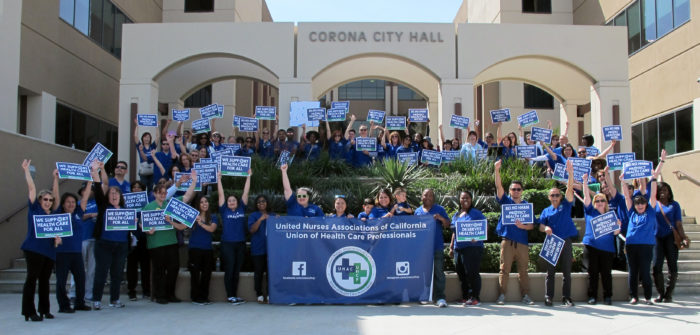FOR IMMEDIATE RELEASE
March 17, 2017
Contact: Linda Sin, Communications Specialist
Linda.Sin@unacuhcp.org | 909-929-5878
With GOP Health Care Plans Dominating the News, Riverside Nurses Deliver Petitions to Congressman Calvert Demanding He Protect Riverside Patients & Community
CORONA, CA—More than sixty nurses and other health care professionals delivered petitions to local Congressman Ken Calvert’s office this afternoon, calling on him to protect and improve Americans’ access to quality, affordable health care, not weaken it.
“In health care, we always say, ‘First, do no harm,’” said Jettie Deden-Castillo, a Nurse Practitioner since 1979 and resident of Calvert’s congressional district. “I’m concerned about how the new health care proposals will impact all of us. They will make us a much sicker society. The Affordable Care Act focused on prevention and the old saying is true, an ounce of prevention is worth a pound of cure. Prevention is much more cost effective than treatment later, when a disease or condition has advanced. The outcomes are much better too.”
Many of the nurses arrived by bus, though because the bus was full many more came by car. Most are tied directly to Calvert’s district and Riverside County either by residence or because they work at Riverside County hospitals such as Kaiser Riverside, Kaiser Ontario-Vineyard, Pettis Memorial Medical Center and Parkview Community Hospital.
Elizabeth Hawkins, RN, is a longtime ER nurse at Kaiser Riverside. “I’m here because I care about patients getting care. It’s not about being a Democrat or Republican. I’m a nurse, not a politician. I’m here because the plans being proposed in Congress will throw millions off their insurance, cut Medicaid, and increase costs to the sick and the elderly most of all. Without insurance, people have no access to preventive care. So they come to the emergency room. That’s not what the ER is there for. We ‘treat ‘em and street ‘em,’ as we put it. It’s not the place for prevention, early diagnosis, treatment of chronic diseases or non-emergency surgeries. We must expand access to quality, affordable health care, not restrict it.”
At Calvert’s office, a delegation of nurses walked into Calvert’s office and requested to meet with the congressman but neither Calvert nor an aide were available to take comments. Nurses presented the office with petitions and signed in to request a town hall and a meeting. The delegation then addressed the larger group outside. Said Hawkins, “I am disappointed because I feel our voices need to be heard. This is about patients getting care. That’s first and foremost. I have always advocated for my patients and I will continue to do so.”
“I came out here to tell my congressman that if he votes to support these new health care plans it will have a severe impact on his constituents,” said Deden-Castillo. “Just look at the cuts to the Centers for Disease Control. What happens when the next disease outbreak strikes, the next Ebola or Zika virus? We need to be proactive, not reactionary. For me as a Nurse Practitioner, it’s all about prevention. If millions of women lose insurance they won’t be able to get mammograms. It’s always easier and cheaper to take care of a small problem than when the problem grows. These proposals are dropping dollars to pick up pennies. No one wants to be sick. Everyone wants to be a productive member of society. No one wants to have diabetes—but if it’s caught early, it can be managed. If it advances, it can mean blindness, amputations, early death. Or a lifetime of dialysis treatments, three times a week for four hours a day.
“I remember a patient who came into the ER,” said Hawkins, “with testicular cancer. This was before the Affordable Care Act. He had no insurance, so he couldn’t get surgery. Sometimes I wonder what happened to him. I had another patient with ovarian cancer. Her husband laid tile. A hard worker, but he couldn’t afford insurance. So they delayed her chemo treatment waiting for the Affordable Care Act to kick in. She probably didn’t survive. We can’t go back there. When it comes to health care we should only take steps forward, not back.
“For me, there are three key issues: affordability, access and outcomes. That’s what I came out here to tell Congressman Calvert. I’ll be paying very close attention to how he votes in Congress.”
###
United Nurses Associations of California/Union of Health Care Professionals (UNAC/UHCP) represents over 28,000 registered nurses and other health care professionals, including optometrists; pharmacists; physical, occupational and speech therapists; case managers; nurse midwives; social workers; clinical lab scientists; physician assistants and nurse practitioners. UNAC/UHCP is affiliated with the National Union of Hospital and Health Care Employees and the American Federation of State, County and Municipal Employees, AFL-CIO. For more information, please visit www.unacuhcp.org | twitter.com/unacuhcp | facebook.com/unacuhcp
